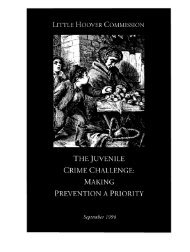Jailhouse Lawyer's Handbook - Sentencing and Justice Reform ...
Jailhouse Lawyer's Handbook - Sentencing and Justice Reform ...
Jailhouse Lawyer's Handbook - Sentencing and Justice Reform ...
You also want an ePaper? Increase the reach of your titles
YUMPU automatically turns print PDFs into web optimized ePapers that Google loves.
Chapter Six: The Legal System<br />
<strong>and</strong> Legal Research<br />
If you’ve had to do legal research before, you know<br />
how confusing it can be. Sometimes the whole legal<br />
system seems designed to frustrate people who are not<br />
familiar with the law <strong>and</strong> to make them totally<br />
dependent on lawyers.<br />
The law could be written <strong>and</strong> organized in a way that<br />
allows ordinary people to underst<strong>and</strong> it <strong>and</strong> use it. The<br />
National Lawyers Guild <strong>and</strong> other groups are engaged<br />
in a political struggle to make the law accessible to the<br />
people.<br />
This chapter of the <strong>H<strong>and</strong>book</strong> gives the basic<br />
information you need to use the rest of the <strong>H<strong>and</strong>book</strong>.<br />
The chapter is only a general introduction to legal<br />
research for a Section 1983 lawsuit. It does not explain<br />
how to research other legal problems you face, <strong>and</strong> it<br />
does not go into every detail that could be useful for a<br />
Section 1983 suit.<br />
If you plan to do a lot of research, you will probably<br />
want to read some<br />
more books. A good<br />
detailed explanation of Important Books<br />
all types of legal<br />
You Can Order<br />
research is a book<br />
called “Cohen <strong>and</strong> Cohen <strong>and</strong> Olson’s Legal<br />
Olson's Legal Research in a Nutshell,<br />
Research in a<br />
8 th Edition<br />
Nutshell,” which West Publishing<br />
might be in your 610 Opperman Drive<br />
prison library. If not, Eagan, MN 55123<br />
you can order a copy<br />
for $25.50 (plus tax). The Bluebook: A Uniform<br />
Technical legal terms System of Citation<br />
are defined in<br />
Attn Business Office,<br />
Ballantine’s Law Bluebook Orders<br />
Dictionary <strong>and</strong> Harvard Law Review<br />
Black’s Law<br />
Association<br />
Dictionary, one of Gannett House<br />
which is supposed to 1511 Massachusetts Ave.<br />
be in your prison Cambridge, MA 02138<br />
library. The detailed<br />
rules for every kind of More order information<br />
legal citation are in a available in Appendix E.<br />
paperback called The<br />
Bluebook: A Uniform<br />
System of Citation, which you can get for $16.<br />
A. THE IMPORTANCE OF PRECEDENT<br />
To underst<strong>and</strong> how to make legal arguments, it is<br />
important to have an underst<strong>and</strong>ing of our court system.<br />
This section focuses on the Federal Court system.<br />
Every state has its own state court system, which is<br />
separate from the federal system.<br />
1. The Federal Court System<br />
The federal court system is not separated by state, but<br />
rather by districts <strong>and</strong> circuits. A federal suit begins in a<br />
United States District Court. The District Court is the<br />
trial court of the federal system. In total there are 94<br />
U.S. District Courts. Some states, such as Alaska, only<br />
have one district. Others have several. New York, for<br />
example, is composed of four districts: the Northern,<br />
Western, Eastern, <strong>and</strong> Southern Districts. District<br />
Courts all have the name of a state in them, like the<br />
“Eastern District of New York.”<br />
Someone who loses in the District Court has a legal<br />
right to appeal to the United States Circuit Court of<br />
Appeals. The Court of Appeals is divided into regions<br />
called “circuits.” There are 11 circuits in the United<br />
States that have number names. For instance, the “First<br />
Circuit” includes all the districts in Maine, New<br />
Hampshire, Massachusetts, Rhode Isl<strong>and</strong>, <strong>and</strong> Puerto<br />
Rico. D.C. however, is just known as the “D.C.<br />
Circuit;” it does not have a number.<br />
Someone who loses in the Court of Appeals can ask for<br />
review by the United States Supreme Court. This is<br />
called “petitioning for certiorari.” Generally, the<br />
Supreme Court can decide which decisions it wishes to<br />
review, called “granting cert.” <strong>and</strong> can refuse to review<br />
the others, called “denying cert.”<br />
2. How Judges Interpret Laws on the Basis of<br />
Precedent<br />
To sue on the basis of Section 1983, you must show<br />
that an official of the state or local government, or<br />
someone acting with authority from the state or local<br />
government, has violated your rights under the U.S.<br />
Constitution or federal law. (See Chapter Two). Most<br />
Section 1983 cases are based on one of the<br />
Constitutional Amendments. The amendments that are<br />
most useful for a suit based on Section 1983 are<br />
reprinted in Appendix C at the back of this book.<br />
Amendments are very short <strong>and</strong> they are written in very<br />
broad <strong>and</strong> general terms. Courts decide what these<br />
general terms mean when they hear specific lawsuits or<br />
“cases.” For instance, you probably already know that<br />
the Eighth Amendment prohibits “cruel <strong>and</strong> unusual<br />
JAILHOUSE LAWYERS HANDBOOK – CHAPTER SIX<br />
68





